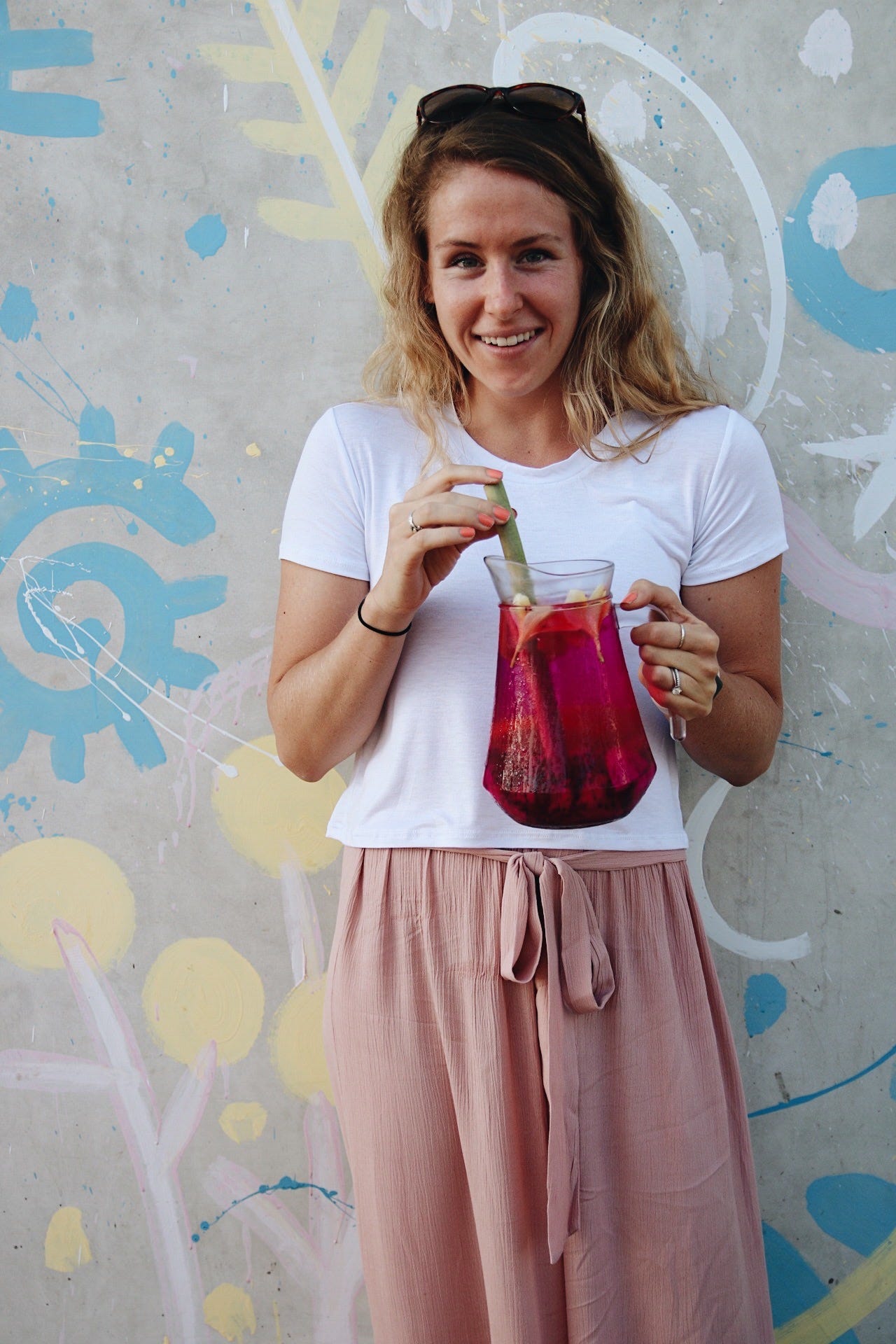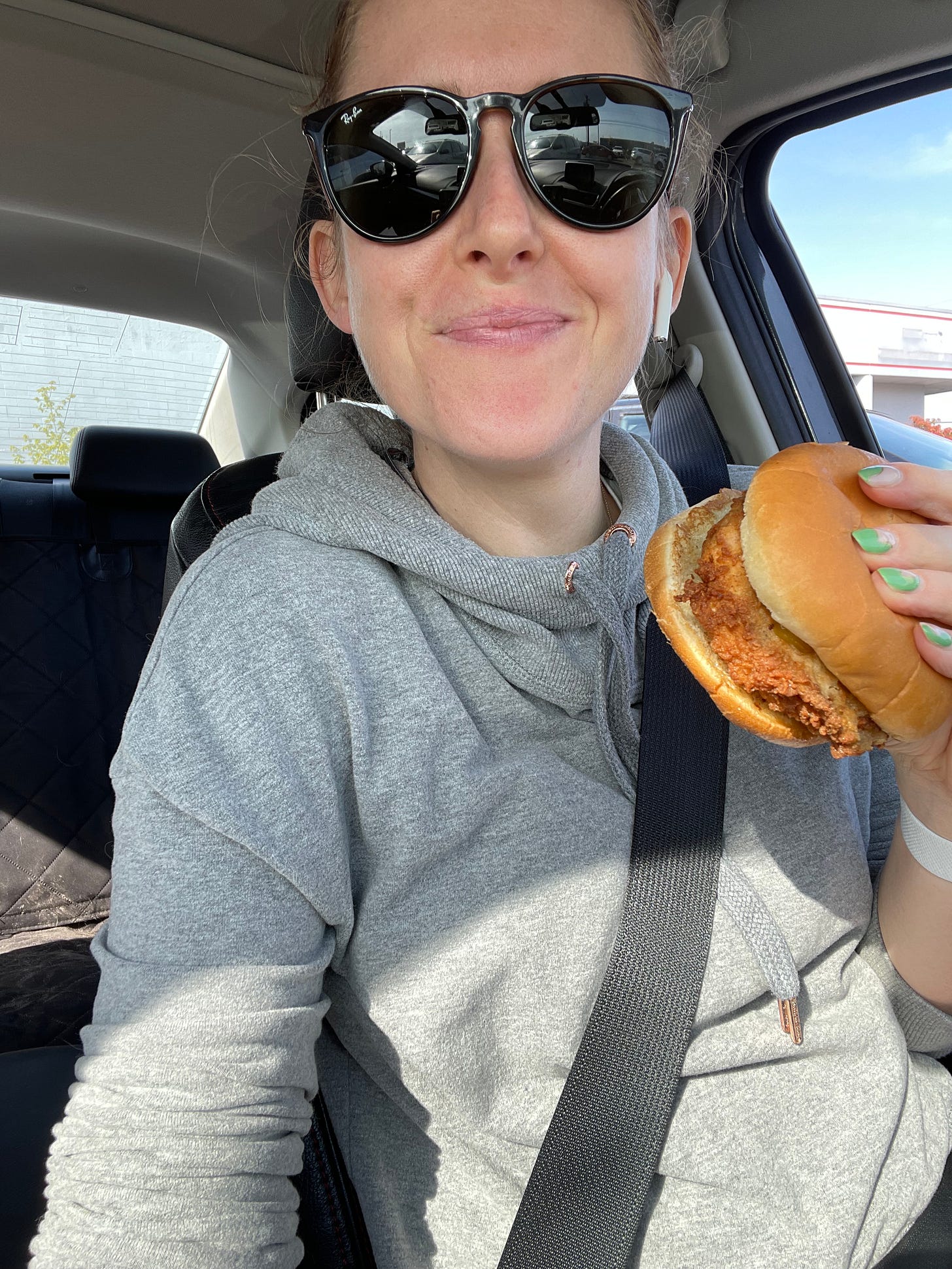no. 12: going plant based
my case for cutting back on meat in 2024, my experience going vegetarian cold-turkey, and my top 7 tips for making the change.🍑🥦🥭🥥🥑🌿
Wellness, by Nathan Hill. I mentioned a few weeks ago that Wellness was likely to be my last book of 2023, and I’m here to tell you that I *loved it*. Tightly connected narrative dots, interconnected backgrounds, and excessively cited (actual) research - extremely up my alley. My favorite part? A sort of “bottle episode” chapter utilizing explanations of how various social media algorithms work to chart the slow radicalization of a character into conspiracy theories. Surprising, but captivating, and I laughed out loud multiple times.
While I was on the hunt for holiday gifts for friends and fam, I came across the Choose app- a discovery app focused on highlighting unique, environmentally and ethically conscious, up and coming brands. The app offers daily curated sales, and has been an excellent source of discovery and inspiration. I recently replaced my ancient and disintegrating at home workout mat with a Stakt mat, and am eyeing some of the Organic kids clothes for little bear. I reached out to the team and snagged a discount code for y’all - use “coffeewithmaggie” for $20 off. (not sponsored!)
One of my personal challenges for 2024 includes simplifying and cleaning out my closet. Inspired by
I’ll be following a modified version of the “75 Hard Style Challenge” - I’ll be doing 30 days of getting dressed everyday, documenting my outfits, not buying anything new, and of course, organizing and cleaning out my closet. Very excited to get creative and have some clear documentation of what I *actually* wear, where there are some gaps, and looking back on what I thought I wanted to buy. let me know if this is something you’d be interested in more detail on!
hello my friends! today we are talking about food, and specifically about adopting plant based lifestyles. For your visibility before you jump in , there are passing references to health conditions and diet culture in the main section, largely in the context of discussing my experience transitioning to a plant based diet. If that’s not your jam today, the tips, recommendations and recipes start about halfway down 🤍
Last issue, I talked about how firmly I believe in the magic of a new year as an opportunity to try something new. Whether it’s starting a new hobby or implementing a major lifestyle change, there is no bad time to build the life you want to live.
January can be a really fun time to jump into a community of people making similar changes, and may increase the likelihood you stick to it: The community energy around Dry January year after year is often an entry point into a longer term Sober Curious lifestyle. Similarly to the way many people are reducing or reexamining the amount of alcohol they drink, many folks are also trying to eat less meat and adopt a more plant based diet. Some recent surveys show that up to 15% of the US identifies as eating a primarily plant based diet, including vegan, vegetarian, or flexitarian.
To me, this isn’t surprising: concerns about climate change are growing with every passing day, and it's well documented that meat and dairy have outsize impacts on carbon emissions. The EAT-Lancet report recommends adapting a Planetary Health Diet: one that is plant forward, and significantly reduces the proportion of meat and dairy.
Plant based diets are not only more climate friendly, but also have significant health benefits: a plant based diet is associated with a significantly reduced risk of health outcomes like high blood pressure, high cholesterol, and heart disease. There are indications that a vegetarian diet can improve blood sugar control and insulin response. Research shows that plant based diets reduce levels of inflammatory markers commonly associated with aging and adverse health outcomes like Alzhiemer’s disease, osteoporosis and cancer.
Nutrition and climate aside, Eating less meat can improve your mood via reduction of oxidative stress. Adopting a plant based diet is also generally associated with quality of life improvement. This is less well researched, but simply put: people feel better physically, have positive emotional feelings about “doing their part” for the planet, and feelings of belonging to a community.
All that to say: today I’m sharing my top tips for going plant based.
Whether you want to commit all out to Veganuary or are just interested in reducing how much meat you regularly eat, it’s all a step in a great direction and I am *here for it*. If you’re newer to the party, let me share my bonafides before we jump in:
After being born and raised in a real meat and potatoes family, I went vegetarian cold turkey when I was 26 and haven't looked back.
Going veggie started as a personal challenge— I had been loosely interested in it after college, especially after a friend in med school talked to me about her research that led her to make the switch. But whenever push came to shove, I could never commit: I lived in LA during the Whole30 craze, was afraid I would be too hungry (“but what about the protein!?!”) and, as someone who *loves food* I was more than a little afraid to “miss out” on delicious experiences.
This went on for a few years, until in 2018 I signed up for an immersive yoga teacher training in Bali as part of a little ~ quarter life crisis~. In keeping with more traditional yogic teachings and general lifestyle approaches in Bali, part of training was maintaining a vegetarian diet. It wasn’t strictly enforced, but the only food that was served was plant based… so it pretty much was.
And since I’m not one to do things halfway, I determined that as soon as I left for Bali, I would commit to trying the veggie thing. Mostly, I didn’t think I could do it. So I had to try. I figured I would live off protein bars at YTT and go back to my regular life when I got home. In reality, the immersive experience was genuinely life changing.
At the training, I had the opportunity to try a plant based diet without needing to also learn how to also cook it all at the same time: I learned how to construct a meal, I got to try out a bunch of new-to-me foods, and had the opportunity to see how I felt after 5, 10, 20 days plant based. Remarkably, I was always satisfied, never “stuffed”, loved the diversity of tastes and flavors and felt super clear headed, strong and digestively happy.
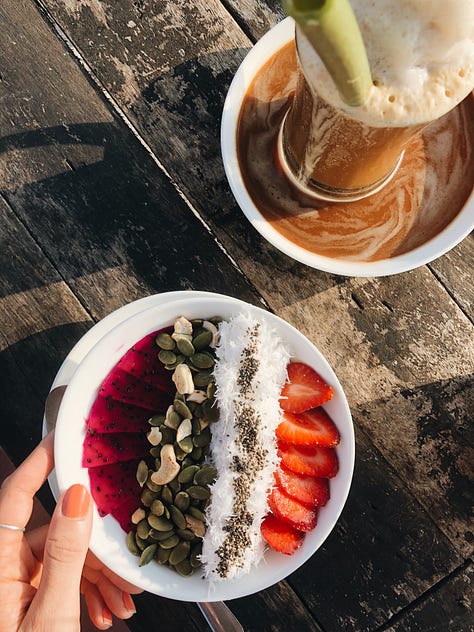
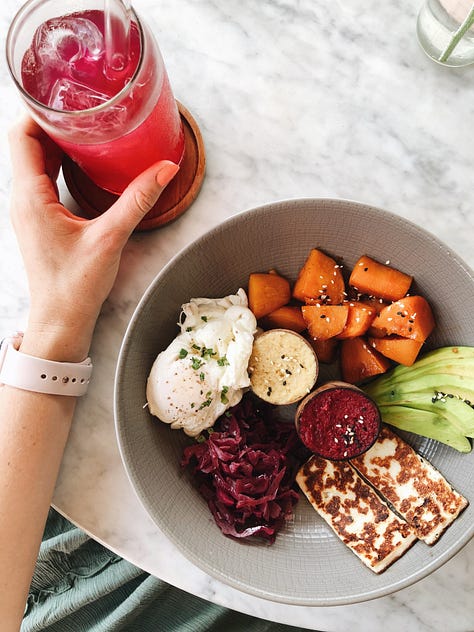
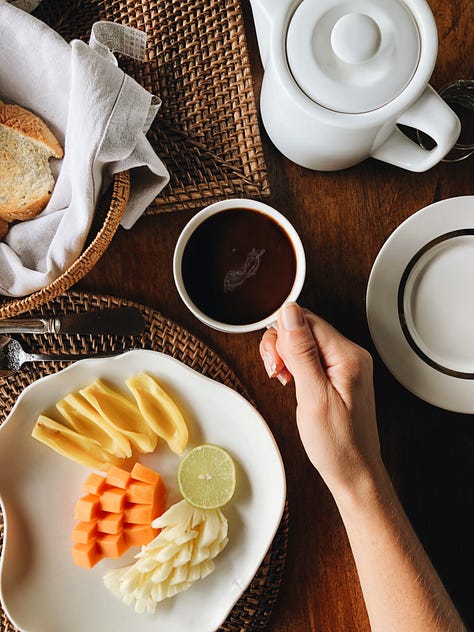
I thought that once I returned home to the reality of cooking myself three meals a day without a private chef at a tropical oasis the allure and luster might wear off, but once again I found the benefits far outweighed the challenge. It was and continues to be an amazing learning experience: I reframed and relearned what I know about cooking and how to construct a meal. I got creative in the kitchen and so many foods I had never tried, or hard convinced myself I didn’t like are now staples of my everyday diet, like tempeh, tofu, and an alarming amount of actual vegetables (tomatoes, mushrooms, literally any kind of bean). I learned about the cultures that have developed and maintained wonderful plant based recipes, and found amazing writers like Alicia Kennedy talking about the future of food justice.
Ironically, the experience of adopting an objectively restrictive dietary plan also showed me in real time just how many foods that trendy diet culture had scared me out of eating with fear and some questionable science (gluten, sugar, “simple carbs”, soy, and, ironically, dairy). I have spent alooooooot of time in the past five years unlearning diet-culture’s greatest hits, doing my best to re-learn principles of nutrition (and of course, the question of protein) from a more neutral standpoint.
As of today’s writing, I’ve been primarily plant based for five and a half years. Not only did the change positively impact my health (shoutout to my PCP’s consistently shocked response to my cholesterol and blood pressure) but it also positively impacted my athletic performance: since going plant based I’ve successfully trained for some of the hardest physical feats I have ever accomplished: the W Trek, The Enchantments through-hike, summiting Mt. Kilimanjaro, running a 5:30 mile just because, pregnancy, one year + of breastfeeding.
Some of these meals have been elaborate spreads of fresh fruit and a zillion kinds of veggies, but most of them have just been kind of … normal. After the novelty wore off, it was just part of everyday life, including the same hyperfixation meals and girl dinners and being too lazy to cook anything and eating pieces parts out of the fridge for two hours.
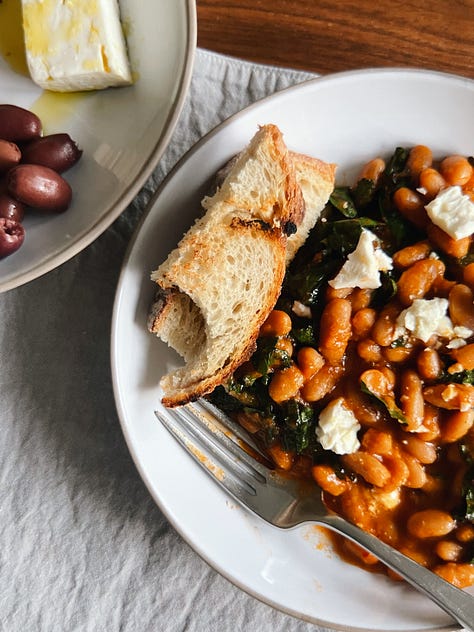

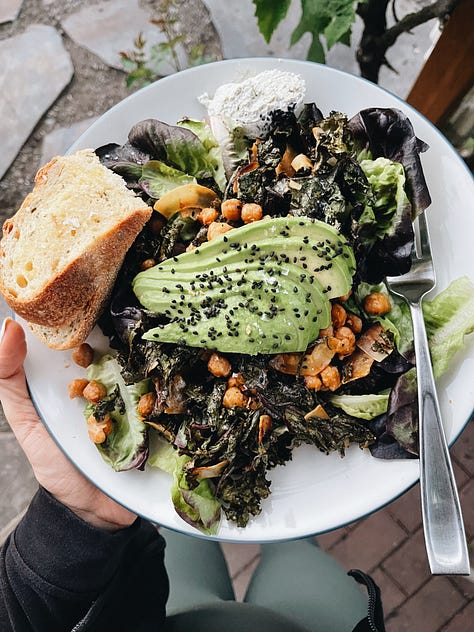
Part of how I have navigated the past five years is by following a piece of advice a vegan yoga teacher training friend offered me - what she calls her “when in Rome” rule. Essentially, committing to a plant based life, but making do with what you have, where you are.
With this in mind, I do occasionally still eat meat: usually for sentimental or politeness reasons, like Thanksgiving, or if someone had cooked a meal for me and it was important to me to enjoy that with them. Sometimes it’s simply a matter of convenience, like while traveling. Rarely do I feel like I want or “need” to eat meat: the only real exceptions were a 3 week window during pregnancy and a 2-3 month period this past year when our little bear was doing a major growth spurt and I started craving chicken in a way I never have. After the both ended, *any desire* for chicken disappeared as quickly as it arrived - talk about “listen to your body” moments.
As I mentioned above: it was so unexpected to me that the experience of committing to a restrictive diet would actually be the experience that would help me to understand and confront my relationship with food rules of any kind (not only the diet culture ones) and regularly, actively make intentional choices about how to nourish my body, how to vote with my dollars, and how to act with compassion for myself and the planet.
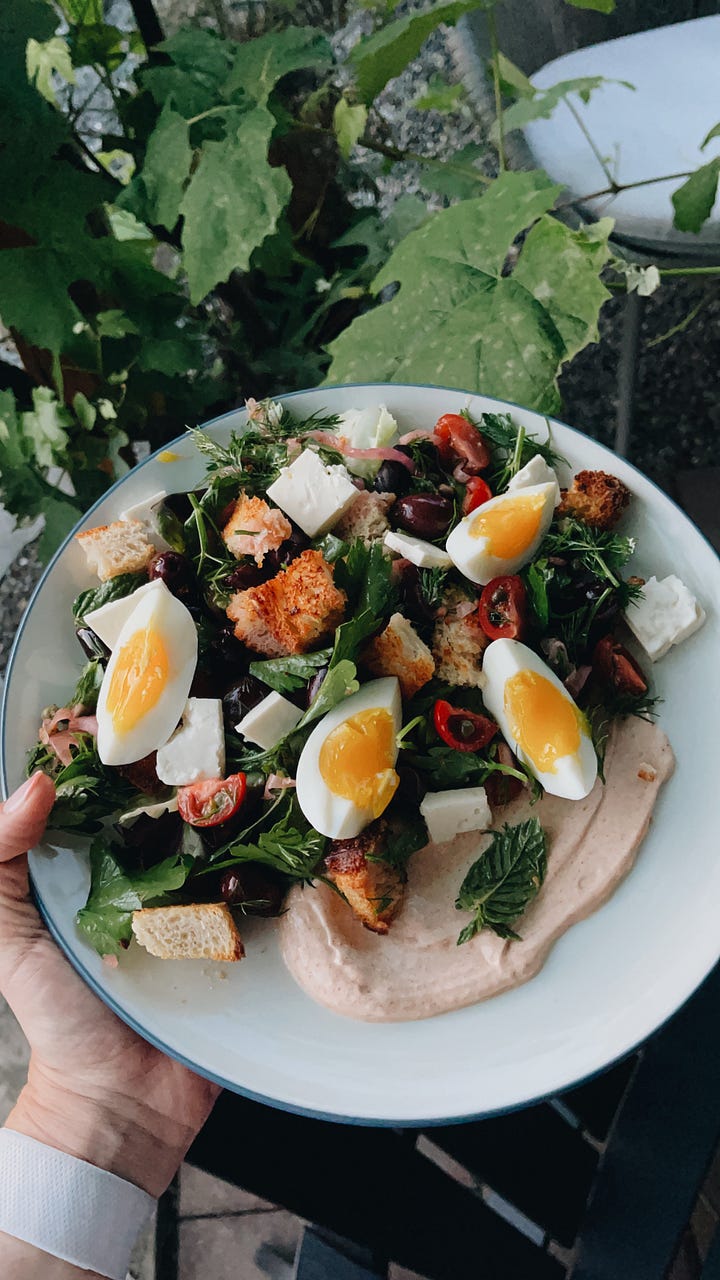

For most people, The point of a plant based diet is a little bit of everything: a little bit of health, a little bit of climate, a little bit of animal and human rights. The point is not perfection: The point is not a rigid and inflexible set of rules, an exhausting daily focus on what you can and can’t eat, on purity and “cleanliness”. Your health and well being, ethical concerns, the planet… All of those things can be positively impacted, even with imperfect adoption of a plant based lifestyle.
Today, five years and change later, identifying as plant based comes with a tentifier; primarily, but not exclusively. It’s listening to my body, not a hard and fast rule. It’s doing what I can with what is available to me, and savoring every delicious minute.
xx,
TOP TIPS FOR GOING PLANT BASED 🥑🌿✨
Making such a huge change can feel overwhelming, so I’m sharing some practical pro-tips. These are by no means exhaustive, but if you start here, you’ll be in great shape!
#1: Add, don’t just eliminate.
If you are used to centering a meat protein in your meals ( like a meat entree with a side of vegetables) just omitting the meat will leave you with a sad plate, and an incomplete meal. Make sure you’re replacing the nutrients you’re omitting with a range of hearty plant based options like tofu, tempeh, seitan, high protein grains or legumes.
#2. Throw what you know.
One of my favorite mentors loves a ski analogy for trying new things: either you change the speed, or you change the slope – but you don’t do both at once. I love cooking new recipes, but you don’t always know how they’re going to turn out, and sometimes it’s 9 pm and you’re hangry and standing in the kitchen with eight million dishes and 20 minutes left on the timer. No thank you! Try starting by swapping in plant based alternatives in recipes you already know and love. Love chicken fajitas? Swap in portobello mushrooms or seasoned seitan to keep changes minimal and accessible.
#3. Start Simple:
With the expanding plant-based consumer packaged goods market, many people would recommend plant-based meat alternatives like Beyond Meat or Impossible (or any number of the zillion products that have exploded onto shelves in the past 2-3 years. I’ll be honest: I don’t personally love most of these, taste, price, or concept wise. They can be a good stepwise introduction into eating less meat, but many of them are very expensive, full of a lot of non-vegetable ingredients (and so. dang. salty. as I always say: vive la veggie burger. ) I really encourage you to try to keep it simple: beans (especially in bulk) are extremely cost effective ($1.39 at whole foods?), and “basic” plant based proteins like tofu, tempeh and seitan aren’t much more expensive ($2.50 - $6.00).
#4 Expect to eat *more*.
Many plant based meals are less calorically dense than animal products, and being mindful of how your meals are composed to adjust for that will help with your transition. One thing to be especially mindful of? How much of your meal is made up of raw veggies (high volume, high fiber, lower fat / protein content), and how much is made of more calorically dense ingredients like avocado, tofu, legumes, seeds, whole grains, nuts, etc. If you’re feeling really full but not satisfied (think: eating a whole bag of shredded kale. That is so much volume, for not much oomph)? Consider reducing the proportion of raw veggies, increasing the fats and proteins and/ or incorporating more cooked vegetables into the total makeup of your plate.
#5. Whole food, plant based:
I was hesitant to include this one, because I do *not* want to push any subliminal messaging about what kinds of food are good and what kinds are not. But, the original framing of a “plant-based diet” came from a nutritional biochemist named Thomas C. Campbell, who emphasized the importance of the quality of a plant based diet. In short: It is fully possible to be vegetarian and rarely eat actual plants. I have been there, done that. Part of why I don’t personally love meat and dairy alternatives is because of how quickly you can find that that’s the majority of what you’re eating (spoiler alert: it never felt great). My tip: Do what you can to incorporate an abundance of fruits and veggies, plus whole grains and unsaturated fats - and try to savor the processed stuff for when you know you’ll really enjoy it, not on the day to day.
#6. Learn about eating locally and seasonally.
Especially, consider what that looks like in your region. Buying produce in season is much more cost effective, likely, more delicious, and occasionally better for the environment. There are some excellent websites that share regionally details on when produce is in season where – I love this one from our Co-Op in the PNW.
#7. Progress, not perfection.
As above: Do the best with what you have, where you are.
I have a… not insignificant cookbook collection. (reader, it is becoming a problem) these are some of the best of the best on the delicious veggie-forward recipe front. some of them are specifically plant based, and some just happen to have amazing veggie recipes. generally speaking, you can’t go wrong with any of them!
Salad Freak by Jess Damuck - broken out into recipes by season, I LOVE what Jess has done here. Tons of great flavor and texture combinations, and not a sad salad in sight. She has a new cookbook coming soon and I’m very excited about it!







